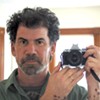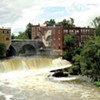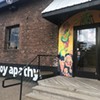click to enlarge 
- Courtesy of David Dobbs
- Science writer David Dobbs
Montpelier's David Dobbs, a science writer
whom Seven Days profiled in June 2014, has won a
prestigious Kavli Science Journalism award from the American Association for the Advancement of Science for his 2013 essay "The Social Life of Genes." Dobbs won for the "magazine" category; other prizes were awarded to science journalism in print, on television and radio, and online. The awards were announced on November 6.
Funded by and named for the Kavli Foundation — a trust dedicated to "advancing science for the benefit of humanity" — the award consists of a $3,000 prize that Dobbs will collect at the AAAS conference in San Jose in February 2015. Founded more than 150 years ago, the AAAS is one of the oldest and most respected of all American science foundations; the organization also publishes the journal
Science.
"The Social Life of Genes," which was
originally published in the journal Pacific Standard, investigates the ways in which organisms' social environments affect the expressions of their genes. In its treatment of genetics as a branch of social science, the essay suggests new and controversial avenues for the study of heredity.
"The trick in writing about science," says Dobbs in a phone interview, "is to try to find some research that's finding something new and exciting, but that also has a good chance of having legs. ['The Social Life of Genes'] is about an area of research that's been growing for the last 30 years, especially as people have been looking more and more extensively at gene expression."
To study gene expression, Dobbs clarifies, is not the same thing as studying genes themselves. "Most of your genes are actually inert most of the time," he says. "When they're activated, that's called gene expression — it's like a piano key that gets pressed."
Dobbs' article reports on research that shows that certain social situations can result in rapid changes in gene expression — in other words, that environmental changes can result in genetic changes. Such a notion is both controversial and a subject for fascinating new research.
"Our social experience includes the workings of ourselves, which makes a difference in how you feel and how healthy you are," says Dobbs. "It's a nice insight that gets right down into your DNA."
In addition to his shorter-form work (some of which is on his blog,
Neuron Culture), Dobbs is the
author of four books. He's currently at work on another, whose working title is
The Orchid and the Dandelion; it's due to be published by Crown in 2015.

















































